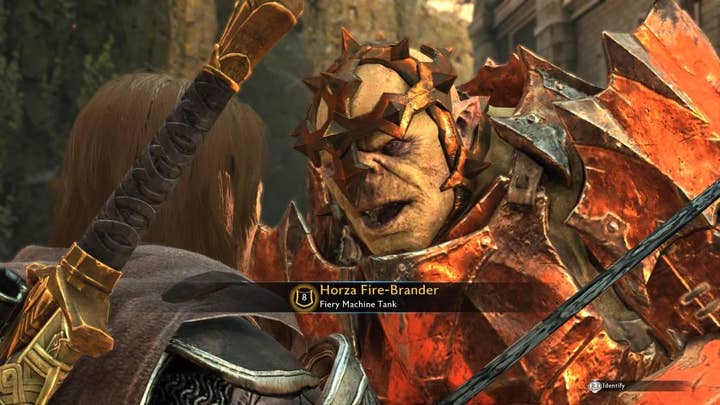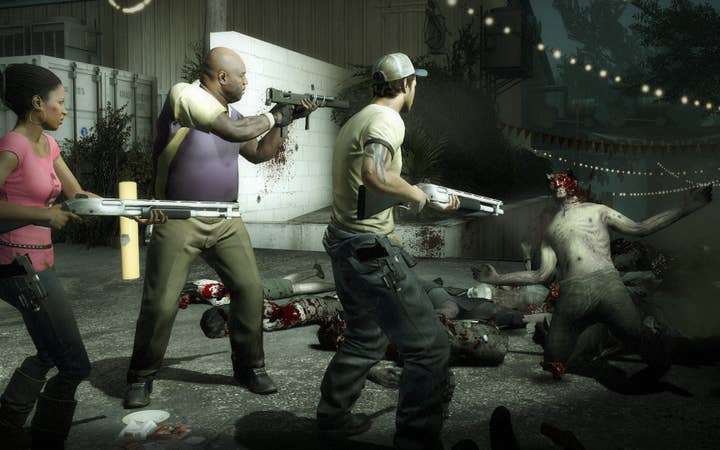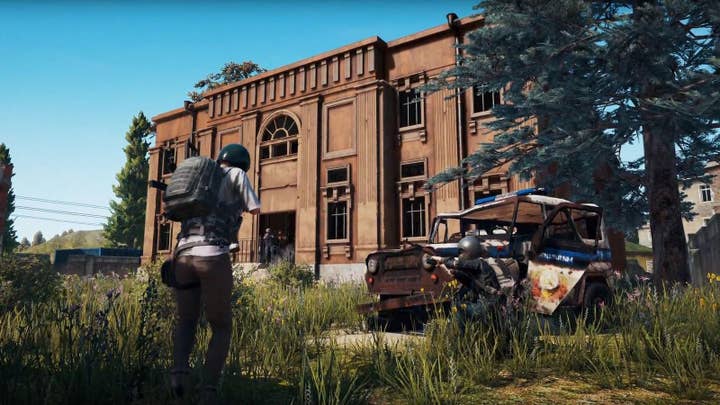Chet Faliszek's AI-powered tactical shooter (that's not about shooting)
The Valve writer discusses why he joined Bossa and how he wants players to tell their own stories
In perhaps the most surprising hire of the year, Chet Faliszek - the man who penned Portal and Left 4 Dead - joined UK developer Bossa Studios.
It's a major coup for Bossa, to be sure, but it's a seemingly odd move for the writer to leave the hallowed Valve in favour of a studio best known for quirky titles about woefully poor surgeons and playable bread.
But Faliszek tells GamesIndustry.biz his shift was the culmination of a long-running friendship between himself and the Bossa team, and a much needed return to game development. For the final three years of his 12-year stint at Valve, Faliszek worked on the firm's virtual reality efforts but he also filled his time playing around with artificial intelligence and its potential applications in video games.

Often meeting with the Bossa team at conferences and other events, he soon discovered that they had been doing the same thing, with the two parties “approaching the same kind of problem but from two very different angles.”
“We'd both come to the conclusion that this solves a bunch of the core problems that stops you from really giving a player agency,” Faliszek tells us.
“There's also something about the size [of Bossa] I like. The team wants to take risks and do something different. One of the things I would talk about with Imre [Jele, co-founder] and Henrique [Olifiers, CEO] is I wanted to try something we could fail at. Only a studio our size could take the risk on something like this and be agile enough [to build it].”
Faliszek has a little difficulty describing his first project at Bossa. He initially positions it as a co-operative tactical shooter, but that's already an oversimplification.
“It's a really broad range of things,” he says. “If you're just shooting, we've failed. It should have a broader set of verbs than that, you should be able to do different things.”
"I wanted to try something we could fail at. Only a studio our size could take the risk on something like this and be agile enough [to build it]"
It's perhaps easier to explain, or at least hint, at what the game might become by discussing the two core pillars Faliszek identifies: AI and story.
The former is something that an increasing number of companies are looking into, both within the games industry and without, to the point where AI is rapidly becoming a buzzword firms use to sound like they're on the cutting edge. But Faliszek's three years in VR has taught him to understand “the difference between hype and the real thing”.
“There's definitely a lot of hype [around AI],” he acknowledges. “[There is confusion around] what people think is AI and what isn't - there was an 'AI' doing a TV interview and giving witty answers, but they'd known the questions ahead of time and programmed it to do that. Same with stories of an AI writing Emily Dickinson - it's not coming up with great poetry from scratch, it's being fed and bunch of poetry and it's mimicking it.
“People's perception of where AI is and the reality of where it really is do not match. It'll be interesting as we go forward, because our bet is on making a great game where no one even talks about the AI but that we're only able to make because we're using the AI.”

There are already plenty examples of how AI is used to power combat systems in games - Faliszek's own Left 4 Dead games used an AI director to handle pacing - but the former Valve writer is confident his new project will be one of the first where it is “the underlying thing that drives everything.”
“Right now, we're not trying to craft anything because once you start going down that road, you'll want to do more - and that will increase the need for a larger team or more time,” he says. “Instead, we're trying to create systems that will do this.”
"If you're just shooting, we've failed. It should have a broader set of verbs than that, you should be able to do different things"
Faliszek talks of a game where each player's experience is unique to them, where NPCs “do the unexpected but understandable”. His focus on NPCs reacting to player actions in more varied ways, of feeling more real, are reminiscent of Monolith Productions' Nemesis system in Middle-Earth: Shadow of Mordor and its sequel.
“Shadow of Mordor's a great example of how [AI] affects that game, makes you feel about that game, how you interact with characters and how it can make things personal,” Faliszek agrees. “We wanted to bring that across with all aspects of the game so you could understand where, if you get into trouble or face problems, you understand how you got there. You understand the path - either your defeats or victories - that got you there."
He continues: “That's what we mean by story, too. When we say story, it's often people thinking big monologues and that kind of story. But story is also activities and actions and different elements. When we talk about story and the narrative, that's what we're exploring. That gives you a broader range of interactions you can have with NPCs.”
Faliszek recently gave a talk to developers about his new project, which Bossa later posted to YouTube, in which he said “the best stories are the ones players can tell about themselves”. It's a phrase that instantly brings to mind online multiplayer shooters like PlayerUnknown's Battlegrounds, where tales of narrow escapes, incredible triumphs and hilarious failures are common - although in such cases this is entirely dependent on the other players in the match.
“That's a perfect example,” Faliszek says. “[Stories come from] all the other players, there's no AI in that game in that sense. So how can you do that where it's just NPCs? That's our challenge, that's what we're going after.”
The decision to make his tactical shooter (that's not just a shooter) a co-op affair was a conscious one - not only to offset the inevitability that certain players will actively try to ruin the experience for others, but also to solve a lot of the problems he used to run into on previous projects like Left 4 Dead.
"People's perception of where AI is and the reality do not match. Our bet is on making a great game where no one even talks about the AI but we're only able to make because of AI"
“In those games, the player characters will only ever say things we've written,” he says by way of example. “I once had to write for another game a line that went something like 'go pick up that thing over there' - because we didn't know what the thing we might add to the game would be or where it would be.
“It would have been awesome to just tag that item, give the words to the AI, the AI understands what it's sitting next to and just be able to say it. There's a lot of busy work in language that it'd be nice to not write.”
He continues: “It's not just language, it's activity and actions as well. Hopefully, it will surprise you. One of the nice things with that side of the AI is, if we do it right, it doesn't need to know everything - it just needs to know the right words. It can choose its own words, it doesn't need to be an NPC saying 'hey, you're double crossing me', they could say 'hey, you're screwing me over' or 'I'm mad at you'. There's a lot to play around with.”

The notion of betrayal also alludes to another reason why Bossa's game won't be a traditional shooter. The entire genre is built on titles where the conflict has already begun, but Faliszek says players will be “starting in peace”, then given motivation to explore the world and “either be helpful or negative to other people”. The adventure stems from them, with different NPCs reacting differently to players depending on their previous actions.
“Those kind of interactions, the kind of stories that derive from there make some level of sense but they're not as structured as classic stories,” he says. “The AI will be looking and going 'oh wait, you're about to meet this character but you don't know if they're mad at you or not, you've only met nice people lately and lived a very peaceful existence, let's put an antagonistic guy there'.
"You don't have to just defeat everything or kill everything, you can befriend or ally or share a common goal"
“The trick is making sure you're not just antagonising the player, or stopping them from handling things the way they wanted to. You have to make sure it doesn't feel random. You also have to make sure you're not encountering the same things: 'oh, it's this one again'.”
Throughout our discussion, Faliszek stresses that the 'verbs of play' will be different to traditional shooters. While there will still be plenty of opportunities for players to run, shoot, kill, he's keen to enable them to befriend or ally as well.
“Most games now are about challenge and difficulty - and I'm not going to get into that argument, but there are more to games than this,” he says. “Some games are built around the fun of building or the sense of accomplishment in solving a puzzle or outsmarting somebody. Those aren't just straight up challenges, or mechanic-based affairs. We're trying to open it up for that, because then it opens us up to other verbs. You don't have to just defeat everything or kill everything, you can befriend or ally or share a common goal.”
But describing the game as a tactical shooter instantly implies defeating things. By shooting, in fact.
“Yeah, and we struggle with whether that's the right way to describe it or not,” Faliszek acknowledges. “There's a framework for all that happening in the game, but there needs to be more than that. If everyone you meet in the world is someone you want to shoot, we've failed. You want to enable players to interact or have different relationships with the characters.”
He continues: “I get worried that when we talk about stories and narrative devices, people think it's going to be this big, text-heavy adventure but it's not that. It's an action kind of thing that allows you to do other things you don't typically do in these type of games.”

Even so, it all sounds a lot more serious than previous Bossa titles - or even Faliszek's past works. Between them, the writer and the studio have produced the comedy interactions of Portal, Surgeon Simulator and I Am Bread - so is this a major departure for Bossa?
“I wouldn't say the game is a comedy or wacky, but there's a sense of [levity] that works and mirrors with my own,” Faliszek assures us. “If I tried to write the most serious game in the world, it would not be serious by the end of it - I just couldn't pull that off. I have great respect for people who can do that, but I can't. I'm going to start making jokes at some point.”
"If I tried to write the most serious game in the world, it would not be serious by the end of it - I just couldn't pull that off"
Faliszek is unable to comment on the exact structure of the game, but it does sound like it will be less dependent on strict missions and funnelling players from event to event. We've all experienced that frustration when you cross an invisible boundary that triggers the warning “You are leaving the mission area”, forcing you to turn back, but Faliszek is keen to ensure his game is more open.
“A player should always be able to walk away from a story,” he says. “If you say no, they have to go do this story, all of a sudden that becomes a gate. You're imposing on them and robbing them of agency. If you're simply putting a bunch of things blocking players from what they want, they then have to decide whether it's worth it or not, whether to engage with it and how they would navigate through those obstacles. That's what our prototypes are exploring, and trying to figure out how to add obstacles without them becoming a gate, without saying there's only one way to do something.”
Overall, it sounds like Faliszek is taking the concept of game design back to something akin to Dungeons & Dragons: players are presented with a scenario and make their own decision on which course of action to take, with the Dungeon Master (in this case, the AI) determining the consequences. Is that what he's aiming for?
“A little bit,” he says. “Those are some of the terms we were using when first talking about this project: the 'game master' idea, and if you decide to do something crazy how much would the DM go along with it before roping you back in. It was a good framework to think about some of these things.”
He concludes: “I'm kinda scared to say we're doing something different, because someone's going to go 'oh no, this game already did that', but we're trying.”








